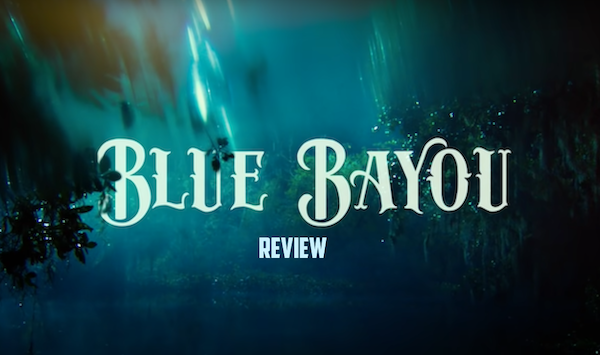Blue Bayou: A Social Drama About Immigration That's Laid On Too Thick
Writer/director Justin Chon shines a light on an outrageous immigration loophole with his overly weepy social drama, Blue Bayou. Overflowing with melodrama and steeped in tragedy, this bleary-eyed tearjearker goes straight for the heart but lays it on so thick that it nearly eclipses the important topical issues it seeks to illuminate.
Antonio LeBlanc (Chon), a Korean adoptee raised in a small town in the Louisiana bayou, is married to the love of his life Kathy (Alicia Vikander) and step-dad to their beloved daughter Jessie. Struggling to make a better life for his family, he must confront the ghosts of his past when he discovers that he could be deported from the only country he has ever called home.
With Blue Bayou, writer/director Justin Chon seeks to do two things: open our eyes to a very real legal loophole in U.S. immigration, while simultaneously filling them with tears. Although he manages to generate a conversation, Chon definitely loses sight of the topical aspects of this story and gets lost in frivolous sub-plots that churn this heartfelt indie into what Bill Maher would call “tragedy porn.” Instead of limiting its focus on immigration and the family that’s directly impacted by it, Blue Bayou becomes too preoccupied with these unnecessary story elements, which ultimately bloat its runtime and muddy its impact. It also doesn’t help that the melodrama is played up to the rafters for emotional affect, so much so that it begins to feel like a beautifully shot, lightly poetic Lifetime movie, as opposed to a discussion piece.
The film is built around a U.S. bill that granted any foreign-born adoptees from 2000 onwards American citizenship and the illogical loophole that allows anyone who was adopted prior to that to be eligible for deportation. This is the predicament that Antonio LeBlanc (Justin Chon) finds himself in after a heated verbal agreement in a supermarket leads to his arrest. Adopted by a white foster family when he was only 3, Antonio has lived in Louisiana for 30+ years and considers it his home, but this baffling legal quirk threatens to uproot him from his wife Kathy (Alicia Vikander), his step-daughter Jesse (Sydney Kowalske), and a newborn that’s on the way. The stakes are high and the consequences are severe; if he fights the case and loses, he’ll be separated from his family and permanently denied reentry into the country.
There’s compelling stuff here, no doubt about it, but at every turn, Chon finds new and increasingly improbable ways to dig a deeper and more tragic hole for his protagonist, Antonio LeBlanc (played by Chon himself), and his family; there’s Antonio’s troubled childhood and criminal past, Kathy’s ex-husband and Jesse’s nonexistent biological father (who’s also a cop). As these moments stack up, they dull down the narrative and cause us to forget about the reality of this immigration loophole until we’re presented with the end-credit statistics and images of a few real-life individuals who were impacted by this legislation. Over time, the film slowly shies away from its intimate introspection in favor of ham-fisted tragedy. Worst of all, it feels the need to pin a villain to its story when it isn’t needed. Instead of making the antagonist U.S. immigration laws, Chon decides to tack on a bad guy with Emory Cohen’s repugnant officer Denny.
Blue Bayou is overstuffed, overcomplicated, and full of trimmable fat, but it sure does look good. There’s a magical quality to Ante Cheng & Matthew Chuang’s dreamy and blue-soaked cinematography. They really do the film a lot of favors, which Chon’s sloppily lyrical direction occasionally undercuts. More often than not, Chon plays things too loose and carefree when you’d like him to tighten up. There are several scenes that would have majorly benefited from a more measured approach. It reminded us a lot of Andrew Morgan’s film Long Gone By, which also dealt with deportation, crime, and family, albeit in a much more simple and grounded way. Had Blue Bayou taken this route and striped away its unnecessary sub-plots, it would have been a much stronger film that created a deeper conversation. The thick layers of tragedy just really reduce it and make it feel as though it’s using its topical themes as a means of snagging an Oscar nod. If you’re anything like us, you’ll be rolling your eyes instead of dabbing them with Kleenex by the time it reaches its cliche final moments.
In short, Blue Bayou is definitely a story that needed to be told, but Chon’s approach is ultimately too heavy-handed which is apt to keep many viewers from fully engaging or taking it serious. As eye-opening as it is, it can be doubly eye-rolling, but it’s lifted up by its gorgeous 16mm cinematography, its sprinkling of Eastern mysticism, and the heartfelt performances that are at its center. It’s definitely dragged down by a few swampy sub-plots, but it still manages to start a conversation around a very real loophole that is idiotically uprooting folks for no good reason.
Recommendation: If you don’t mind a film unapologetically tugging on your heartstrings and you aren’t turned off by a lack of subtlety, give Blue Bayou a watch.
Rating: 2.5 supermarker arrests outta 5.
What do you think? We want to know. Share your thoughts and feelings in the comments section below, and as always, remember to viddy well!



